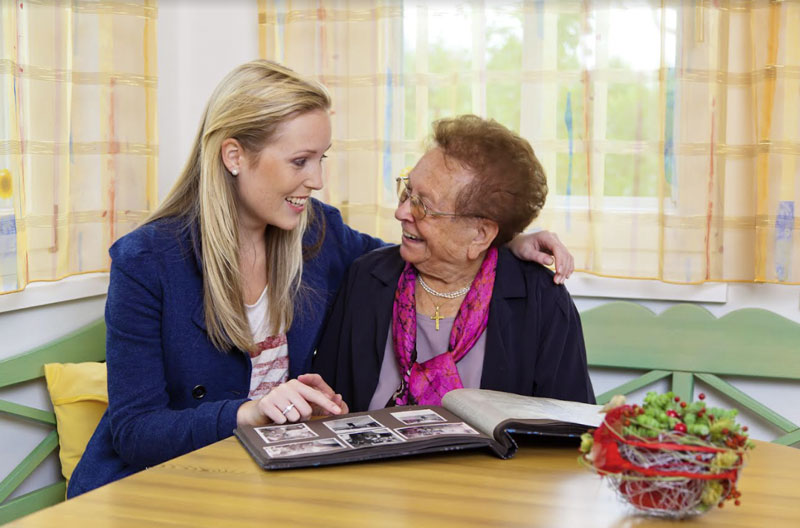Connecting with others is a basic necessity that we all share. It’s been shown to greatly influence both our physical and cognitive health. Yet people often mistake the vital role it plays for the individual who has Alzheimer’s or another cognitive illness.
There is a false assumption that those living with dementia lose their capacity or appreciation for engaging with others or the world. But like all of us, having a social relationship with others is critical to their quality of life.
Although it’s true that it may become more difficult to communicate with your loved one as they progress through this illness, there are different ways you can make a connection.
Social interaction and Alzheimer’s
Defining quality of life for those living with a cognitive illness is determined by each individual. But it doesn’t depend on grand gestures. Families should keep in mind that even simple acts can result in feelings of happiness, such as listening to a favorite song together or tapping a memory of a perfect day from years ago.
Research has shown that daily and meaningful interaction with others can help:
- reduce depression
- improve feelings of self-esteem
- improve relationships with others
Interacting for even short periods of time are also beneficial. One study found that relating socially for even one hour a week could significantly improve quality of life and reduce agitation levels.
Ways to improve quality of life
There are other ways to help your loved one engage or to set the stage for successful social interaction. The following are a few you may want to consider if you’re caring for or have a family member or friend living with Alzheimer’s.
- Help the individual maintain physical strength and mobility as long as possible
- Include favorite hobbies, activities or their preferences such as music in their daily lives
- Spend time outdoors
- Encourage your loved one to control what they can. It’s hard not to have choices
- Take steps to make mealtimes as pleasurable as possible
- When planning for visits, outings or appointments, choose the best time of day for your loved one
Tips to socially interact
The importance of social interaction and Alzheimer’s is often misunderstood. But it can also be difficult to achieve because people may find themselves uncomfortable. Even with the best intentions, many may avoid a visit because they’re not sure what to say or how to react.
Learning what you can, talking to the primary caregiver and putting your best efforts forward can make all the difference to the individual with dementia. Even if they are unable to respond as they once did, the pleasure of knowing someone cares is still there.
Try these tips to help prepare for interacting successfully:
1. Be patient and give them time to respond
They may need more time to process and to answer. It’s tempting to interrupt if there’s a pause, but give them time to respond.
2. Be a good listener
Listen carefully but also pay attention to body language. If they’re becoming anxious, it may be time to change the subject or switch to another activity.
3. Speak to the individual
It’s important to speak directly to the person when having a conversation. Don’t talk about the individual to someone else who is in the room.
4. Use gestures and facial expressions
Depending on the level of illness, sometimes it helps to use gestures to aid in understanding, such as handing them their coat to go for a walk.
5. Be respectful
Regardless of the abilities of the person to respond or communicate, always treat them with respect and as an adult. Don’t use baby talk or any demeaning language.
6. Speak clearly with simple sentences
Use short and simple sentences, remembering the challenge for them to follow complex details. As the illness progresses, asking yes or no questions may be best.
7. Make eye contact and introduce yourself
Eye contact when talking conveys interest and connection. If they may not remember your name or who you are, introduce yourself when you enter the room.
8. Reduce distractions
Whether having a conversation or working on a project together, try to eliminate other distractions in the room. Ask if it’s OK to turn off the television or to go somewhere quieter.
9. Connect with their preferences
Think of ideas to involve one of their favorite hobbies or pastimes. Reading a beloved book, looking through photo albums or walking outside are great ways to connect.
10. Laughter is still a great medicine
Remembering funny memories from the past or watching a comical movie or television show can be a great way to connect with each other.
11. Convey that you care
Your presence and efforts will speak to them that you care. Even if you only sit quietly and hold their hand or read them a story, they will be reassured by your presence and kindness.
Ingleside at Rock Creek Memory Support Assisted Living
We understand the significance of social interaction for someone with Alzheimer’s. We design our programs and activities with that in mind and our staff is specially trained to connect with our residents.
We hope the above information and ideas can help you interact with your loved one and to encourage others to participate. Even if conversations are difficult or no longer possible, you can still connect by sharing activities, past memories or simply holding their hand.
Alzheimer’s is a progressive disease and if the time comes when your loved one needs a higher level of care than you can provide, we hope you’ll consider Ingleside at Rock Creek Memory Support Assisted Living.
Our compassionate staff, therapies, programs and residences are all designed to provide our residents with the highest level of care, independence and dignity. We are also a supportive resource to our families.
Please visit our website for more information. Call (202) 846-2651 if you have any questions or would like to schedule a personalized tour today.

